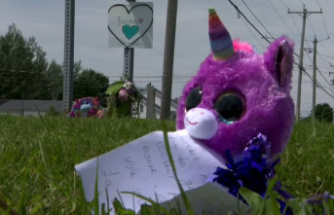Shortly before SPD party president Martin Schulz tries to convince his party of a new edition of Grand coalition. "We have enforced a long list of points that really improve people's lives," said Schulz to newspapers of German editorial network. "There's nothing small about that."
On Sunday in Bonn, SPD wants to have delegates decide wher to enter into coalition negotiations with CDU and CSU on basis of exploratory result. Given major concerns in parts of party, outcome is uncertain. In evening, Berlin State Association voted against opening of coalition talks, as was previously situation in Saxony-Anhalt. In Brandenburg, Groko advocates continued.
Skepticism in important National Association NRWIn meantime, Schulz promoted his course in Dortmund. The party chief met at a preliminary meeting with about 70 delegates from Westphalia-Lippe and members-strong region of western Westphalia, toger with Bundestagsfraktions chief Andrea Nahles and head of North Rhine-Westphalia SPD, Michael Groschek.
Nordrhein-Westfalen is largest SPD national association and represents most delegates at party congress. And here too, skepticism is great. The exploratory paper wears her "too little Social democratic handwriting", said delegate Christa Becker-Lettow from Dortmund before event.
Rejection also by Marcel Frenchy from Höxter. The 34-year-old also wants to vote against. "The social-democratic lighthouse projects I have hoped for are missing." For ors, AfD is main reason for ir rejection: "We do not want AfD to play role of opposition leadership," warned Jens Pablo. He is deputy party leader of self-confident Dortmund SPD.
Schulz appeals to Groko proponentsKarsten Koch from Warendorf district found it good to hear from Schulz again "immediately how negotiations were going". He is prepared to "vote in principle also for negotiations if whole package is true". In his circle mood was very tense. "There are clearly recognizable opponents of coalition negotiations that are very disappointed with content of paper."
Schulz himself had asked proponents of coalition negotiations before delegated preliminary meeting to speak more strongly in party-internal debate: "I encourage everyone who is satisfied to say that aloud." After a good three-hour discussion, he was satisfied: "It was a very open and very constructive exchange of views," he said. There has been a very lively discussion, seriousness of which has impressed him very much.
One of leaders of opponents of a new grand coalition is Juso-head Kevin Kühnert, who sees himself strengned by outcome of negotiations in his critique. In paper negotiated with Union, "many of central goals of SPD" could not be anchored, but at same time his party had to swallow "very bitter pills", Kühnert said. "Previously, as a Jusos, we had already expressed considerable scepticism against a possible grand coalition. This is now easier for us to justify. "
Nahles: Exploratory result not "wantonly" talk BadSPD-Vice Ralf Steger made it clear that he sees result only as a "basis" for coalition negotiations. "It is now done as if everything has already been negotiated – that is not case," he said picture.
SPD Bundestag group leader Andrea Nahles warned party's internal critics that laboriously achieved exploratory result was "wantonly" bad. She accused Jusos in German radio of ignoring successes achieved in talks with Union, for example in case of pensions, education policy or immigration policy.
The Union is increasingly sensitive to demands from SPD after post-negotiations. The results were created by "hard but fair" talks, said CSU chief Horst Seehofer. "It is not possible now to question all this again." Bundestag chief Volker Kauder (CDU) also made it clear in Bild newspaper: "What has now been presented to public as a consensus, re is nothing more to shake."
Also unions for coalition negotiationsCSU Secretary General Andreas Scheuer said he was "annoyed" by debate in SPD. "She is now setting message: We are not satisfied," criticized Scheuer. He recommends that SPD instead debate points that it has enforced.
The leaders of trade unions Ver. Di and DGB also advised SPD on coalition negotiations. The Union and SPD had made a number of appointments in consultation, which would have tangible benefits for workers, said Ver. di chief Frank Bsirske to Handelsblatt.
The DGB chairman Reiner Hoffmann called stabilisation of pension level at 48 percent, increase in disability pension and return to parity health insurance as successes of SPD. There are also weaknesses. The SPD, however, could "not close his eyes and say that I am not taking all this and leave it all".
Date Of Update: 16 January 2018, 12:02









